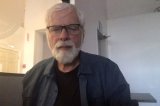The Muse is not the Master
In the shadowland, dreams are misshaped
They become the madness caught within,
Ever fearful of the next day's dawning,
Chased away by every hopeful day, dreams.
Dreams give us hope and begets the muse,
The muse leads us by the nose, to find within
An unique creation, emboldened by pain,
We withdraw and relive what we have lived.
We, you, me, they find or don’t find a muse,
The struggle continues, thrives or dies, but
We, you, me, they persist, and with that
The sun lightens the darkness and we seek.
Either to create, or subsist, that is our call -
Never is it the direction of anyone’s muse.
The muse is the catalyst, the poet’s ache,
The artist’s brush, the composer’s beat.
We, you, me, they have their creations,
in our hearts, we, you, me, they own it.
In the end our soul knows no muse, no
We, you, me, they must have ownership.
About this poem
The struggle to be creatively active.
Font size:
Written on October 25, 2024
Submitted by Kennet on December 08, 2024
- 52 sec read
- 13 Views
Quick analysis:
| Scheme | ABXX CBXA CAAX XCXA XAXX |
|---|---|
| Closest metre | Iambic pentameter |
| Characters | 854 |
| Words | 173 |
| Stanzas | 5 |
| Stanza Lengths | 4, 4, 4, 4, 4 |
Translation
Find a translation for this poem in other languages:
Select another language:
- - Select -
- 简体中文 (Chinese - Simplified)
- 繁體中文 (Chinese - Traditional)
- Español (Spanish)
- Esperanto (Esperanto)
- 日本語 (Japanese)
- Português (Portuguese)
- Deutsch (German)
- العربية (Arabic)
- Français (French)
- Русский (Russian)
- ಕನ್ನಡ (Kannada)
- 한국어 (Korean)
- עברית (Hebrew)
- Gaeilge (Irish)
- Українська (Ukrainian)
- اردو (Urdu)
- Magyar (Hungarian)
- मानक हिन्दी (Hindi)
- Indonesia (Indonesian)
- Italiano (Italian)
- தமிழ் (Tamil)
- Türkçe (Turkish)
- తెలుగు (Telugu)
- ภาษาไทย (Thai)
- Tiếng Việt (Vietnamese)
- Čeština (Czech)
- Polski (Polish)
- Bahasa Indonesia (Indonesian)
- Românește (Romanian)
- Nederlands (Dutch)
- Ελληνικά (Greek)
- Latinum (Latin)
- Svenska (Swedish)
- Dansk (Danish)
- Suomi (Finnish)
- فارسی (Persian)
- ייִדיש (Yiddish)
- հայերեն (Armenian)
- Norsk (Norwegian)
- English (English)
Citation
Use the citation below to add this poem to your bibliography:
Style:MLAChicagoAPA
"The Muse is not the Master" Poetry.com. STANDS4 LLC, 2024. Web. 24 Dec. 2024. <https://www.poetry.com/poem/207373/the-muse-is-not-the-master>.



Discuss the poem The Muse is not the Master with the community...
Report Comment
We're doing our best to make sure our content is useful, accurate and safe.
If by any chance you spot an inappropriate comment while navigating through our website please use this form to let us know, and we'll take care of it shortly.
Attachment
You need to be logged in to favorite.
Log In